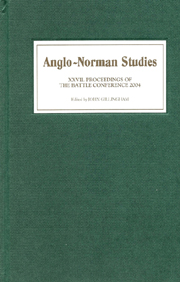Book contents
- Frontmatter
- Contents
- LIST OF ILLUSTRATIONS
- EDITOR'S PREFACE
- ABBREVIATIONS
- Probing the Passions of a Norman on Crusade: the Gesta Francorum et aliorum Hierosolimitanorum
- Gilbert Foliot et l'Ecriture, un exégète en politique
- Writing Warfare, Lordship and History: the Gesta Consulum Andegavorum's Account of the Battle of Alençon
- Anglo-French Peace Conferences in the Twelfth Century
- Peter of Blois and the Problem of the ‘Court’ in the Late Twelfth Century
- Normandy and Norman Identity in Southern Italian Chronicles
- Monastic Chronicles in the Twelfth-Century Abruzzi
- The Impact of Rebellion on Little Domesday
- Setting Things Straight: Law, Justice and Ethics in the Orationes of Lawrence of Durham
- The Angevin Kings and Canon Law: Episcopal Elections and the Loss of Normandy
- Zooarchaeology of the Norman Conquest
- Was Thomas Becket Chaste? Understanding Episodes in the Becket Lives
Setting Things Straight: Law, Justice and Ethics in the Orationes of Lawrence of Durham
Published online by Cambridge University Press: 12 September 2012
- Frontmatter
- Contents
- LIST OF ILLUSTRATIONS
- EDITOR'S PREFACE
- ABBREVIATIONS
- Probing the Passions of a Norman on Crusade: the Gesta Francorum et aliorum Hierosolimitanorum
- Gilbert Foliot et l'Ecriture, un exégète en politique
- Writing Warfare, Lordship and History: the Gesta Consulum Andegavorum's Account of the Battle of Alençon
- Anglo-French Peace Conferences in the Twelfth Century
- Peter of Blois and the Problem of the ‘Court’ in the Late Twelfth Century
- Normandy and Norman Identity in Southern Italian Chronicles
- Monastic Chronicles in the Twelfth-Century Abruzzi
- The Impact of Rebellion on Little Domesday
- Setting Things Straight: Law, Justice and Ethics in the Orationes of Lawrence of Durham
- The Angevin Kings and Canon Law: Episcopal Elections and the Loss of Normandy
- Zooarchaeology of the Norman Conquest
- Was Thomas Becket Chaste? Understanding Episodes in the Becket Lives
Summary
Who eventually becomes a hallowed name in the literary canon for a given historical period is often a matter of coincidence, diverse conjunctures or, simply, inexplicable arbitrariness. Hence for various reasons some medieval authors undeservedly continue to languish in the shade of their better-known contemporaries. One such is Lawrence of Durham, generally neglected and only recently, yet still slowly, rediscovered – mainly by German philologists. The first edition of his main work, the Hypognosticon appeared as late as 2002. Yet judging from the quality of his works and the variety of genres and rhetorical devices he skilfully employed, Lawrence was and is far from being a literary dwarf. Considering the historical value of his writings, the neglect appears similarly surprising; he did after all witness a most stormy period in the history of Durham in particular (the contested episcopacy of William Cumin) and England in general (the reign of Stephen). Lawrence's writings do reflect these contemporary conflicts, though from a distinctly partisan perspective, and no matter what one may think of his literary achievements, his varied opus certainly merits closer attention for several reasons. This article will give a brief introduction to the biography of Lawrence of Durham, his personality and writings, before taking a closer look at a single text, the third and longest of his five forensic declamations, known as the orationes. Finally, I will touch upon a number of central aspects, concerning the meanings and implications of law and justice, and how they may fit into a broader ideological context.
- Type
- Chapter
- Information
- Anglo-Norman Studies 27Proceedings of the Battle Conference 2004, pp. 151 - 168Publisher: Boydell & BrewerPrint publication year: 2005



